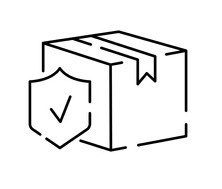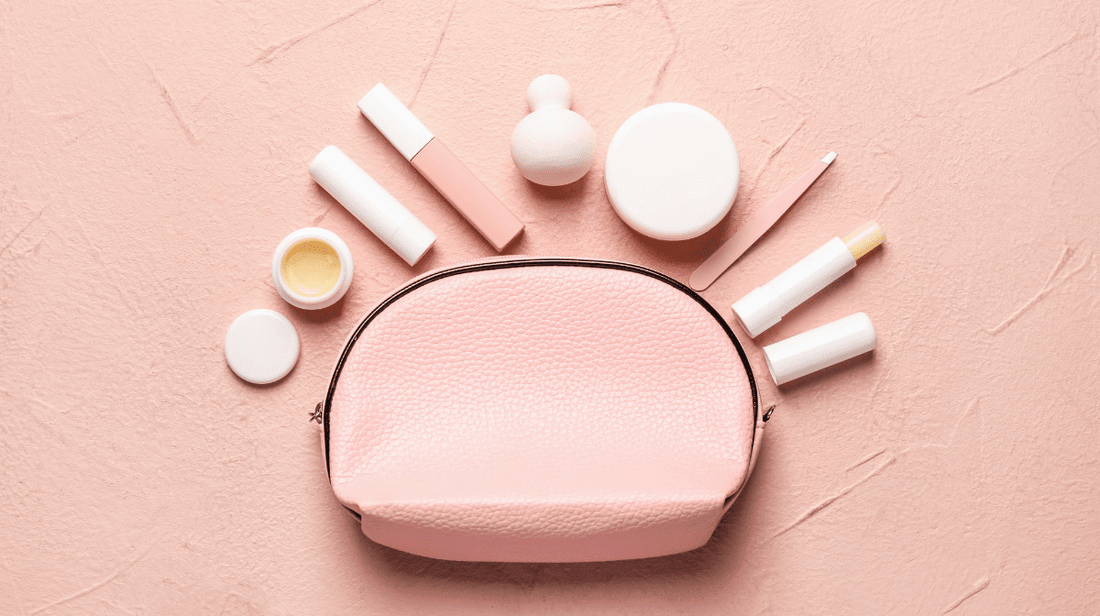
Makeup Hygiene Habits: How Clean Are Your Makeup Bag, Brushes and Sponges?
Share
- Almost 1 in 5 people (19%) have never cleaned their makeup bag. Ever.
- Almost 1 in 10 people (8%) of respondents reported having never cleaned their brushes.
- 15% of respondents have not replaced their sponges in over a year.
- 3% had never (ever) bought a new makeup bag, beauty sponge or brush.
- 37% of respondents said, “it’s hard to make the time to clean makeup items regularly.”
- 53% of respondents have applied makeup in a public location.
Section 1: Australia Wide Findings
How often do we wear makeup, and use makeup applicators and a makeup bag?
Australia is a nation of makeup lovers. 56% of respondents reported wearing makeup daily, with 99% reporting that they wear makeup at least once a week. It’s no surprise that makeup has such a prominent place in our daily lives; giving us confidence and helping to express our personalities.To complete the look, the perfect finish is achieved by using the right tools and applicators. Across the survey, we found that daily:- 48% use makeup brushes
- 37% use beauty sponges
- 44% use their makeup bag
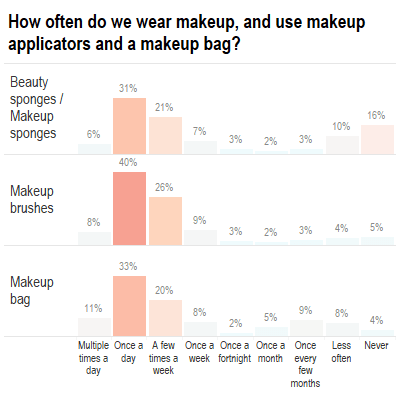 While makeup is included in the daily routines of many Australians, preference in applicators varies, with 16% of overall respondents having never used a makeup sponge, (our question is where were they when the beauty blender came out? …but we digress).With such a high percentage of makeup wearers across the country, we wanted to delve into the often unspoken topic of our beauty routines. Our makeup kit is with us daily as we work to keep our look on point from dusk til’ dawn.Just how aware are we of the impact these environments have on the cleanliness of our products and how may this lead to a potential impact on our skin health?Is the hygiene and cleanliness of the items that we carry with us, as prominent as it should be in our minds?
While makeup is included in the daily routines of many Australians, preference in applicators varies, with 16% of overall respondents having never used a makeup sponge, (our question is where were they when the beauty blender came out? …but we digress).With such a high percentage of makeup wearers across the country, we wanted to delve into the often unspoken topic of our beauty routines. Our makeup kit is with us daily as we work to keep our look on point from dusk til’ dawn.Just how aware are we of the impact these environments have on the cleanliness of our products and how may this lead to a potential impact on our skin health?Is the hygiene and cleanliness of the items that we carry with us, as prominent as it should be in our minds?How often do we clean our makeup bags and applicators?
Everyone has a ‘thing’ that they know they should do, but don’t do it as often as recommended by professionals in the field - it’s just not front of mind. Be that getting your car serviced (guilty) or flossing your teeth. In the long run, we know these things are good for us, but they’re easily pushed to the back of our minds and left forgotten far longer than they should be. That is of course, until your car breaks down or you start getting cavities.Could the reason you’re breaking out have something to do with the fact that you can’t quite remember the last time you cleaned your makeup brushes?Brushes & sponges cleaning habits
In the last month, 58% of people reported cleaning their sponges and 54% cleaned their brushes. Yet the data found that there are many who haven’t:Within the last month, 32% and 37% haven't cleaned their makeup sponge or brush, respectively. With a timeframe that could range from the last 2 months to over 2 years ago.8% of respondents reported having never cleaned their brushes, almost 1 in 10 people.Makeup bag cleaning habits
When it comes to our makeup bags, the stats are shocking. The good news? 34% of Australians have cleaned their makeup bags in the last month. We applaud you and your clean makeup bag.The bad? Almost 1 in 5 people (19%) have never cleaned their makeup bag. Ever. Suggesting an overall lack of awareness when it comes to storage hygiene.Our makeup bags are an extension of ourselves, we bring them on holidays, on nights out, to the office, and for all of our moments that matter. While all of these are fun little excursions for your makeup bag, it’s also picking up bacteria and germs at every stop, and now makeup isn’t the only thing hitching a ride in your bag.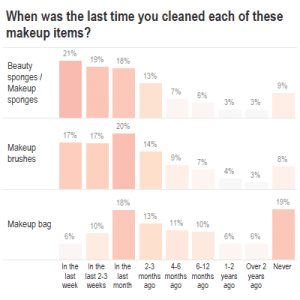
Our advice?
As two-thirds of us (66%) are not cleaning our bags as often as we should be, it's key that this needs to be more front of mind. As such, we recommended that our storage bags are deep cleaned on a monthly basis to properly prevent the build-up of germs and bacteria.A great tip is to thoroughly clean every time you introduce a new product to your collection or, when you use up an existing one. It's also a smart move to declutter by removing products you don't use often, particularly those that are past their prime.When it comes to brushes, these need to be cleaned every 7-10 days. This is essential to remove excess product, oils and bacteria, ensuring your skin stays clear and healthy. Regular cleaning also helps to maintain the integrity of your brushes, providing smoother application and extending their lifespan.Yet when it comes to sponges, we do need to be much more consistent with our cleaning schedules. We recommend that these are washed every 1-2 days, due to their porous nature which traps bacteria more readily than brushes. This frequent cleaning not only keeps the sponge hygienic but ensures it performs optimally for a flawless makeup application and helps better protect your skin from breakouts and irritation.How often are we using skincare products?
We know makeup is a core part of who we are, yet at the end of the night, when makeup goes on, it must come off!82% reported using cleansing products on their skin daily, which tells us that while most of us have great skincare routines, we’re falling short in the same dedication to the cleanliness of our bags and applicators which must improve.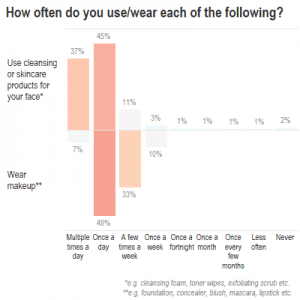
What about our other home hygiene habits?
This behaviour appears to be unique to how we look after our makeup tools and bags.97% of respondents reported that they have cleaned their kitchen surfaces, shower, toilet, bed sheets, and towels within the last week. These are ingrained in our habits of keeping our homes clean and tidy.Our question to you is: are you really going to clean your toilet more than your favourite brushes that you use every day? That’s not us saying one is more important than the other, but we will let you decide your own priorities…If anything, this only serves to highlight that cleaning our makeup brushes is more heavily procrastinated than cleaning our bathrooms. And that’s kinda weird! As this bacteria growth is being applied directly to our faces, it only serves to undermine the work we put into our good skincare routines.How often do we replace our makeup bags and applicators?
Brushes, sponges and makeup bag replacement When we looked into the habits surrounding the replacement of our beauty products we found:- 15% of respondents have not replaced their sponges in over a year.
- 25% of respondents hadn’t replaced their bag in over 2 years.
- 3% had never (ever) bought a new makeup bag, beauty sponge or brush.
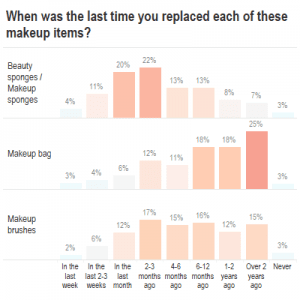
Our advice?
We recommend that sponges should be entirely replaced within 3 months (though if your sponge starts growing any strange lumps, spots or smells, please throw it out immediately)There are more noticeable signs of wear and tear on sponges than with brushes, making them a more frequent candidate to be replaced. After all, how many times have you seen specs of your sponge in your foundation right around the time you bought a replacement?Brush replacement is very dependent on brand, cleaning methods and quality. Typically brushes should last a few years though with good care, but if you see any bristle shedding, fraying, or shrinking, it might be time for the ‘it’s not me, it’s you’ talk.So, while most Australians use makeup almost every day, it’s clear that the maintenance and cleanliness of the tools used and the bags that house our cosmetics aren’t as frequent.And though the survey reported a 57% to 43% split between those who don’t have a regular cleaning routine for their makeup tools and bags, to those who do, the routine needs to occur regularly, and all tools and bags need to be cleaned properly.What’s stopping us from cleaning our makeup items?
When asked why they have a lack of cleaning routine, 37% of respondents said that “it’s hard to make the time to clean my makeup items regularly” and another 26% said, “I just don’t really think to clean my makeup items.”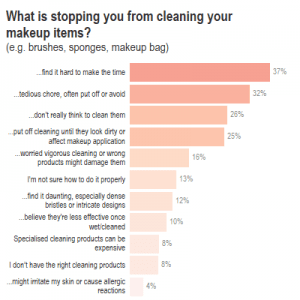 Aruj Javid, Group Pharmacist (MPharm IP) at LOOKFANTASTIC Australia, had this to say about the importance of establishing a routine:
Aruj Javid, Group Pharmacist (MPharm IP) at LOOKFANTASTIC Australia, had this to say about the importance of establishing a routine:“I cannot stress enough the importance of regular hygiene practice to help eliminate hygiene issues many people are unknowingly exposing themselves to during makeup storage and application. Each time we use our makeup brushes, sponges, or dip into our makeup bags, we're not just applying cosmetics; we're potentially spreading harmful and contagious bacteria like Staphylococcus and E. coli, and fungi directly onto our skin. These microorganisms thrive in moist warm environments much like the conditions of our makeup bags where we are keeping our applicators. When transferred to the skin this can lead to breakouts and can also cause skin irritation. Whilst not as common, it can also be a contributing factor for skin concerns such as acne, dermatitis, and can even cause inflammation of the eyelids that may require antibiotics treatment for at least 2- 4 weeks if symptoms persist.”
Section 2: Demographics Findings
Our age and how we live can influence our hygiene habits surrounding our beauty routines. No matter what the reason, it’s clear that our lives keep us busy, so keeping on top of cleaning and maintaining our makeup tools and bags is sometimes put aside for another day.The survey looked into different demographic groups from age to living situation to identify if there are any key differentiators between the generations in Australia. Our findings have shown that as makeup enthusiasts we are all far more alike in our habits than we are different. From how often we apply our makeup to whether we have a defined cleaning routine for our products, there was little variance in the results across these categories.If you’re over 35 years old you're less likely to use a beauty sponge in your makeup routine
The preferences around the tools with which we use to apply our makeup can also vary greatly depending on the generation.Overall, people who use sponges are likely to also use brushes, however not all brush users include sponges in their routine. But, if you are over the age of 35, chances are you’re less likely to reach for a sponge, with only 28% of those aged 35-44 using a sponge every day, compared to 42% using a brush every day.This can be heavily influenced by the ways people were taught to do their makeup, whether that be through reading a magazine or watching your favourite online beauty influencer; you found what worked for you and stuck with it!Sponges are certainly growing in popularity, with 34% of 18-24 year-olds and 38% of 25-34 year-olds using sponges every day for a flawless look - one semi-damp pat at a time.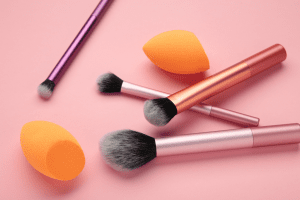
Section 3: Where are we doing our makeup?
It’s no surprise that we all have our preferred place to do our makeup: some people prefer their bathroom, bedroom, or their car. Sometimes when the need arises, places like the bathroom at work, the gym, or on public transport will just have to do.Over the last month, respondents have applied makeup in the following locations:- 88% in their bathroom
- 54% in their bedroom
- 31% in their cars
- 22% in a Hotel room
- 22% in their work bathroom or someone else’s bathroom
- 12% in a customer bathroom or public toilet
- 6% at the gym or on public transport (i.e train or bus)
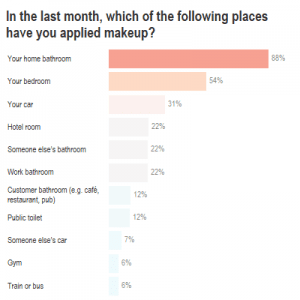 Aruj Javid, Group Pharmacist (MPharm IP) at LOOKFANTASTIC Australia:‘’Where you apply your makeup is equally as important, as locations outside of your home, such as public transport and restrooms present numerous chances for exposure to many types of bacteria. Inadequate or infrequent washing can allow bacteria to grow and build up over time thus affecting our skin.’’It is easier to keep on top of the cleanliness of your own spaces because you know the last time you cleaned your room or wiped your bathroom bench. But if you were asked when the last time the public transport rails were cleaned or the gym bathrooms were disinfected, how confident would you be?We understand that doing your makeup on the bus in the morning or touching up your eyeliner in a restaurant bathroom is unavoidable at times, but it does run the risk of picking up more bacteria and germs that can impact your skin.
Aruj Javid, Group Pharmacist (MPharm IP) at LOOKFANTASTIC Australia:‘’Where you apply your makeup is equally as important, as locations outside of your home, such as public transport and restrooms present numerous chances for exposure to many types of bacteria. Inadequate or infrequent washing can allow bacteria to grow and build up over time thus affecting our skin.’’It is easier to keep on top of the cleanliness of your own spaces because you know the last time you cleaned your room or wiped your bathroom bench. But if you were asked when the last time the public transport rails were cleaned or the gym bathrooms were disinfected, how confident would you be?We understand that doing your makeup on the bus in the morning or touching up your eyeliner in a restaurant bathroom is unavoidable at times, but it does run the risk of picking up more bacteria and germs that can impact your skin.What impact can this have on our skin?
Section 4: Bacteria Build-Up On Used Products
Every time we swipe our brushes or sponges across our faces or dip into our favourite products, we might be doing more than just enhancing our features. We could be spreading nasty bacteria like Staphylococcus, E. coli, and even fungi right onto our skin.These unwelcome guests love to party in the warm and moist environment of our makeup bags, where they find the perfect conditions to multiply. And when they get onto our skin, they can cause all sorts of trouble with minor effects like clogged pores or acne outbreaks. Whilst not as common, it can also lead to more serious issues such as dermatitis or a range of bacterial skin infections.But here's the kicker - every time we use our makeup tools without cleaning them, we're just reapplying these bacteria right back onto our skin. It's like giving these microbes a free ride back to their favourite hangout spot - our faces.In a study, conducted by Aston University’s School of Life and Health Sciences on 467 used makeup products the following was found:- Nine out of ten (90%) of products were contaminated with bacteria and fungus.
- 97% of makeup sponges harboured fungus as well as bacteria.
- 93% of these sponges had never been cleaned.
- 64% continued to be used even after being dropped on the floor.
“Most people know we should be replacing our toothbrushes every three months and washing our bed sheets weekly for our overall health and wellbeing. Yet, it's equally important to also adopt a regular cleaning routine for our makeup, much in the same way we've developed ingrained habits across other areas of hygiene.”
So, let's make a pact to give our makeup bags and tools a little extra love and attention. A few simple steps can go a long way in keeping our skin happy, healthy, and radiant. After all, our skin deserves the best, don't you think?Here are our expert tips for all things hassle-free hygiene.Section 5: Tips for Effective Cleaning
While the threat of irritations, infections and breakouts is scary, cleaning your bags and tools doesn’t have to be! And it doesn’t have to be too complicated either - a simple skincare routine is better than nothing at all, and the same applies to your makeup bag…Cleaning Makeup Applicators (Brushes and Sponges)
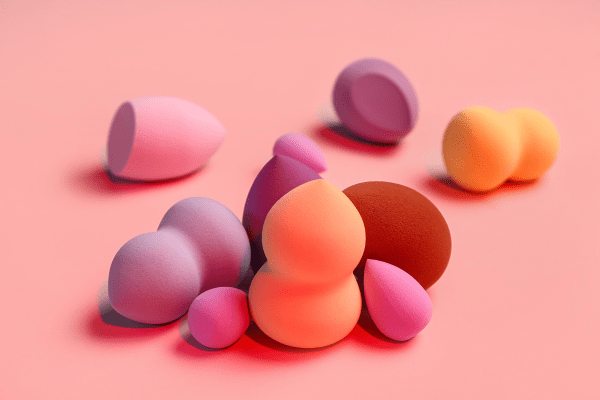 Weekly Washing: Makeup brushes and sponges should be cleaned at least once a week, using a gentle brush cleaner or baby shampoo. For brushes, moisten the bristle with lukewarm water before applying a small amount of cleaner. Gently massage the bristles on your palm and rinse thoroughly until the water runs clear. For sponges, soak in a mixture of warm water and cleaner, then knead and press out any makeup residue before rinsing until clean.Deep Cleaning Your Sponges: As sponges are the biggest culprit for housing bacteria, deep cleaning your sponges can help reduce the build-up. In a microwave-safe bowl, mix water and gentle soap before soaking the sponge, then microwave for about 60 seconds. Be sure to let the sponge cool before squeezing out the excess water.Drying: Once clean, reshape the brushes and dry horizontally, to prevent water from loosening the glue in the handle, on a clean towel. Sponges should be set out to dry in an open space with airflow.Disinfecting: To kill surface bacteria in between washes, use a disinfectant spray designed for makeup brushes and sponges, and allow the tools to dry before the next use.
Weekly Washing: Makeup brushes and sponges should be cleaned at least once a week, using a gentle brush cleaner or baby shampoo. For brushes, moisten the bristle with lukewarm water before applying a small amount of cleaner. Gently massage the bristles on your palm and rinse thoroughly until the water runs clear. For sponges, soak in a mixture of warm water and cleaner, then knead and press out any makeup residue before rinsing until clean.Deep Cleaning Your Sponges: As sponges are the biggest culprit for housing bacteria, deep cleaning your sponges can help reduce the build-up. In a microwave-safe bowl, mix water and gentle soap before soaking the sponge, then microwave for about 60 seconds. Be sure to let the sponge cool before squeezing out the excess water.Drying: Once clean, reshape the brushes and dry horizontally, to prevent water from loosening the glue in the handle, on a clean towel. Sponges should be set out to dry in an open space with airflow.Disinfecting: To kill surface bacteria in between washes, use a disinfectant spray designed for makeup brushes and sponges, and allow the tools to dry before the next use.Cleaning Makeup Bags
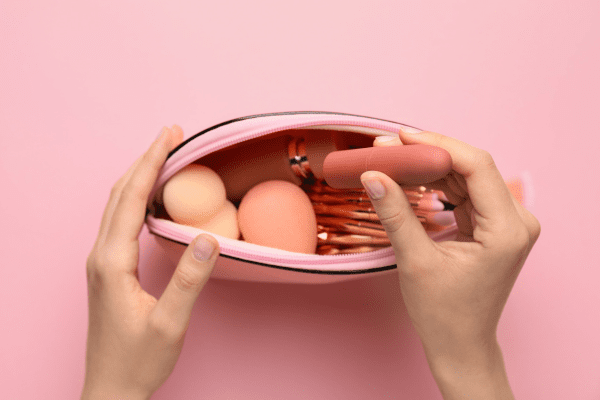
- General clean of Makeup brushes and sponges = once a week
- Deep Clean of Makeup Bag = once a month
- Put it in your calendars!
[product_display id="1"]
Additional Tips
Storage: To prevent the growth of mould and bacteria, make sure to store your makeup bag and tools in a dry cool place. (i.e. not the bathroom after you’ve had a scalding hot shower)Replacement: Pay attention to the condition of your applicators and bag as frayed brushes, torn sponges, and worn-out bags should be replaced. You can find sets that’ll cover all the basic tools you need, like the Real Techniques Everyday Essentials set, but if you’re looking for something a little different, or need extra brushes to add to your set then there are plenty of options to choose from.[product_display id="2"]
Mindful Usage: To prevent cross-contamination, avoid sharing makeup applicators. If you do share, however, ensure the applicators are cleaned and disinfected before and after use.It’s clear. Australians use makeup daily, yet there is a knowledge gap when it comes to makeup hygiene habits. And, there is room for improvement to enhance our routines.So what are you waiting for? If this hasn’t convinced you to go and wash your bag and applicators and take their cleanliness as seriously as your skincare routine, then we don’t know what will…